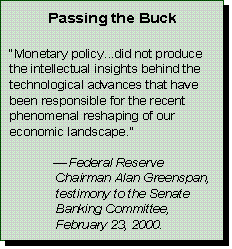 |
||||||||||||||||||||||||
|
||||||||||||||||||||||||
 |
||||||
|
||||||
 |
||||||||||||||||||
|
||||||||||||||||||
 |
|||||||||
|
 |
||||||||||||||||||||||||
|
||||||||||||||||||||||||
 |
||||||||||||||||||||||||
|
||||||||||||||||||||||||
|
What The Media Tell
Americans About Free Enterprise 
Who Runs the American Economy? The bad news is that the news media just canít shake the myth of the all-powerful central planner, whose decisions mean either boom or bust for the whole economy. But the good news is that Federal Reserve Chairman Alan Greenspan doesnít seem to buy it ó not even when the media are singling him out for credit for the long-running economic expansion.
The mediaís praise of Greenspan was reminiscent of the encomia that greeted former Treasury Secretary Robert Rubin when he stepped down in May of last year. On May 12, ABCís Peter Jennings said Rubin had "presided over the best economy in a generation," while NBCís Mike Jensen that same night said the outgoing Cabinet official was "the man most Americans can thank for the countryís extradordinary eight-year economic boom." Itís easy for the media to focus on the relatively small number of high-profile policymakers who do make a difference, but over time that tendency obscures the real story of the booming Ď80s and Ď90s economy. Over the last twenty years, millions of entrepreneurs, inventors, builders, workers and investors have done the real day-to-day management of this expansion, dollar by dollar, product by product. Itís a great story, but the mediaís need for simplicity keeps us all focused on the efforts of the few, while we ignore the accomplishments of the many. In an unfortunate choice of language, Time magazine displayed this bias when it tried to praise Greenspan, Rubin and then-Deputy Secretary of the Treasury Larry Summers. "Their success," Time wrote in its February 15, 1999 cover story, "has turned them into a kind of free-market Politburo on economic matters." This confusion also presents itself in campaign news every four years. Back in 1992, CNNís Bill Schneider told viewers about a poll that his network had conducted. "We asked the voters, regardless of which candidate you support, which one of the three do you think will do a better job in handling the economy?" he related on the October 26, 1992 edition of Inside Politics. The faulty premise that presidents manage the economy, repeated so often in news reports that year, was a crucial factor in Bill Clintonís victory over George Bush. According to CNNís Ralph Wenge on election night, "It appears that the issue of the economy is where the Bush/Quayle campaign really lost out, and lost out in a big way. A third of the voters approved of Mr. Bushís handling of the economy, but 65 percent either disapproved or strongly disapproved. In fact, Bushís perceived mishandling of the economy proved critical." Even though Bush repeatedly argued that the U.S. economy was caught up in a "global economic downturn," virtually no one in the media even attempted to correct the misimpression that Bush was personally culpable. Part of the problem is the way reporters frame the campaign story, and part of the problem is the way pollsters measure public opinion. Writing in USA Today in April 1996, Richard Benedetto summarized one of his paperís polls: "Clinton, up for re-election, now outscores Republicans in managing the economy, welfare and taxes." Why do pollsters routinely ask citizens which candidate they think can better "manage the economy" when the truth is that neither presidents nor Treasury secretaries nor Fed chairman really "manage the economy?" In his testimony last week to the Senate Banking Committee, Greenspan gave most of the credit for the record nine-year expansion to the private sector. "Underlying this performance, unprecedented in my half-century of observing the American economy, is a continuing acceleration in productivity," Greenspan reported. "There are few signs to date of slowing in the pace of innovation and the spread of our newer technologies that, as I have indicated in previous testimonies, have been at the root of our extraordinarily impressive productivity improvement." "Monetary policy, of course, did not produce the intellectual insights behind the technological advances that have been responsible for the recent phenomenal reshaping of our economic landscape," Greenspan testified. "It has, however, been instrumental, we trust, in establishing a stable financial and economic environment with low inflation that is conducive to the investments that have exploited these innovative technologies." "As the U.S. economy enters a new century as well as a new year, the time is opportune to reflect on the basic characteristics of our economic system that have brought about our success in recent years. Competitive and open markets, the rule of law, fiscal discipline and a culture of enterprise and entrepreneurship should continue to undergird rapid innovation and enhanced productivity that in turn should foster a sustained rise in standards of living," said Greenspan. Thatís the sort of Economic 101 lesson that many reporters, eager for the latest hint about future interests rates, just donít hear. But as the media strive to tell us which candidate would best "manage" the economy over the next four years, Mr. Greenspanís words are a timely reminder that the real credit belongs with the people themselves.
Home | News Division
| Bozell Columns | CyberAlerts |
||||




 The
latest round of applause for the Fed chairman began when President
Clinton nominated him for a fourth term on January 4, 2000. That
night, CBSís Dan Rather called Greenspan "the maestro of monetary
policy." Earlier this month, after he was confirmed by the Senate,
Thalia Assuras, anchor of CBSís The Saturday Early Show,
called Greenspan "the main architect of this long boom."
The
latest round of applause for the Fed chairman began when President
Clinton nominated him for a fourth term on January 4, 2000. That
night, CBSís Dan Rather called Greenspan "the maestro of monetary
policy." Earlier this month, after he was confirmed by the Senate,
Thalia Assuras, anchor of CBSís The Saturday Early Show,
called Greenspan "the main architect of this long boom."